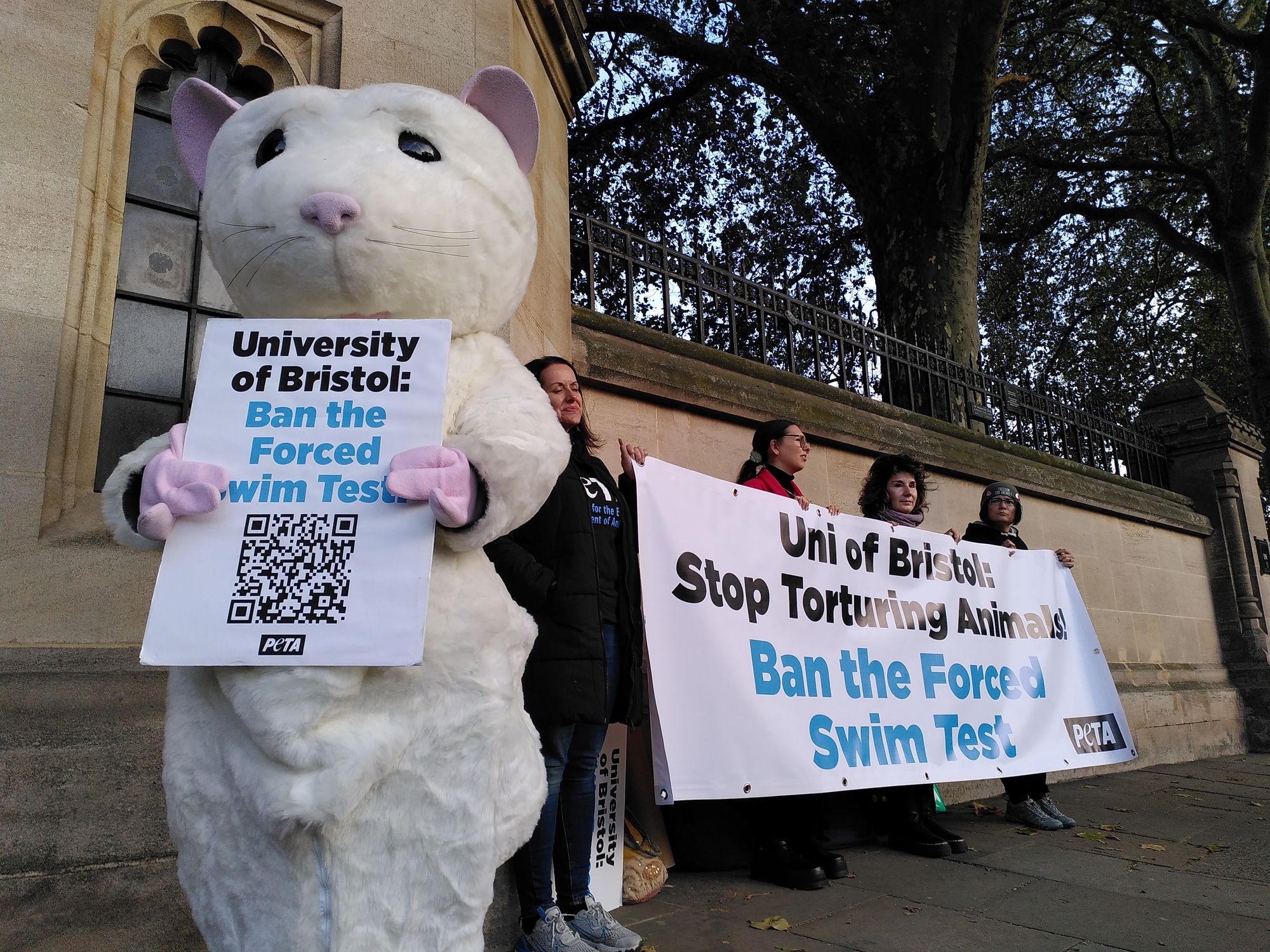By Milan Perera, Deputy Editor and Roya Shahidi, Co-Editor-in-Chief
A group of anti-Forced Swim Test protesters disrupted the State of the City address held in the Wills Memorial Building on Wednesday, 18th October.
The protestors voiced their objection to the use of the Forced Swim Test, demanding the University halt it in scientific experiments. The demonstration was organised by People for the Ethical Treatment of Animals (PETA).
The protesters stormed the Great Hall during the address of Professor Evelyn Welch, Vice-Chancellor at the University of Bristol.

They carried placards and chanted the slogans: ‘Bristol Uni, Drop the Forced Swim Test!’
The City Address is a part of the 2023 Festival of the Future City, which included addresses from Marvin Rees, the Mayor of Bristol, and the Vice-Chancellor of the University of Bristol, Professor Evelyn Welch.
This follows action on Tuesday, October 17 when a group of PETA supporters surprised attendees of the University of Bristol London alumni branch’s annual lecture by staging a protest calling for, ‘the end of the cruel forced swim test.’
The lecture was delivered by the former Director General of MI5, Lord Evans of Weardale.

Speaking to Epigram, a spokesperson for the protest group said: ‘When conducting this widely discredited test, experimenters at the University of Bristol induce panic in vulnerable small animals like rats and mice by forcing them to swim in inescapable cylinders of water. Terrified of drowning, the animals attempt to climb the sides of the container and even dive underwater looking for a way out.'
‘Experimenters believe this can somehow reveal something about the way humans experience and cope with stress. They kill the animals when they are done with them – either by gassing, inflicting blunt-force trauma to the head, inducing anaesthetic overdose, or breaking their necks – and then study their brains.’
Kate Werner, Senior Campaigns Manager at PETA said: ‘In an absurd attempt to understand human mental health, the University of Bristol forces tiny animals to experience the fear of drowning.'
‘This cruel and pointless experiment should have no future in this city, and PETA is calling on the institution to move with the times and join the rest of the UK’s top universities in dropping this test.’
The protest group further added: ‘Despite a student-led motion condemning the test, the University of Bristol continues to torment and kill animals. Among others, the universities of Brighton, Exeter, Liverpool, Manchester, Nottingham, and Southampton as well as Newcastle University and King’s College London have indicated they neither use the near-drowning test nor intend to do so in the future.’

The Home Office is currently reviewing its policy on the forced swim test.
The advice made public in July 2023 from the Animals in Science Committee – an independent advisory body to the Home Office on issues relating to the Animals (Scientific Procedures) Act 1986 – recommended that the human relevance of the experiment must be demonstrated when the forced swim test is intended to be used as a stressor.
After several minutes of disruption, the protesters were escorted off the premises by the security personnel present at the event.
Regarding these developments, a University of Bristol spokesperson said: 'We recognise there are differing views about the use of animals in research, including some concerns around whether it is ethical.'
'The University of Bristol has a successful track record of translating scientific discoveries into real-world advances. Wherever possible we rely on non-animal methods for example computer models, cells grown in the laboratory or human volunteers.'
'When these methods are not suitable to address the scientific gaps, and therefore only when absolutely necessary, we use animals in research to improve our understanding of health and disease in both humans and animals. This includes cardiovascular and cancer research, diseases associated with infection and immunity and, in the case of forced swimming, significant advances in the understanding of stress-related disorders.'
'We are committed to a culture of openness and transparency regarding the research carried out here at Bristol, ensuring the animals are treated with compassion and respect. We keep up to date with the latest thinking on all aspects of research using animals (including advances in welfare) and have robust and thorough ethical review processes in place for every project.'
Featured image: Milan Perera
Do you think the university should stop its use of the Forced Swim Test?









